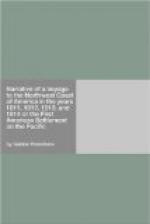Having arrived at the foot of the rapids, they commenced the portage on the south bank of the river, which is obstructed with boulders, over which it was necessary to pass the effects. After they had hauled over the two canoes, and a part of the goods, the natives approached in great numbers, trying to carry off something unobserved. Mr. Stuart was at the upper end of the portage (the portage being about six hundred yards in length), and Mr. Keith accompanied the loaded men. An Indian seized a bag containing articles of little value, and fled: Mr. Stuart, who saw the act, pursued the thief, and after some resistance on the latter’s part, succeeded in making him relinquish his booty. Immediately he saw a number of Indians armed with bows and arrows; approaching him: one of them bent his bow and took aim; Mr. Stuart, on his part, levelled his gun at the Indian, warning the latter not to shoot, and at the same instant received an arrow, which pierced his left shoulder. He then drew the trigger; but as it had rained all day, the gun missed fire, and before he could re-prime, another arrow, better aimed than the first, struck him in the left side and penetrated between two of his ribs, in the region of the heart, and would have proved fatal, no doubt, but for a stone-pipe he had fortunately in his side-pocket, and which was broken by the arrow; at the same moment his gun was discharged, and the Indian fell dead. Several others then rushed forward to avenge the death of their compatriot; but two of the men came up with their loads and their gun (for these portages were made arms in hand), and seeing what was going forward, one of them threw his pack on the ground, fired on one of the Indians and brought him down. He got up again, however, and picked up his weapons, but the other man ran upon him, wrested from him his war-club, and despatched




